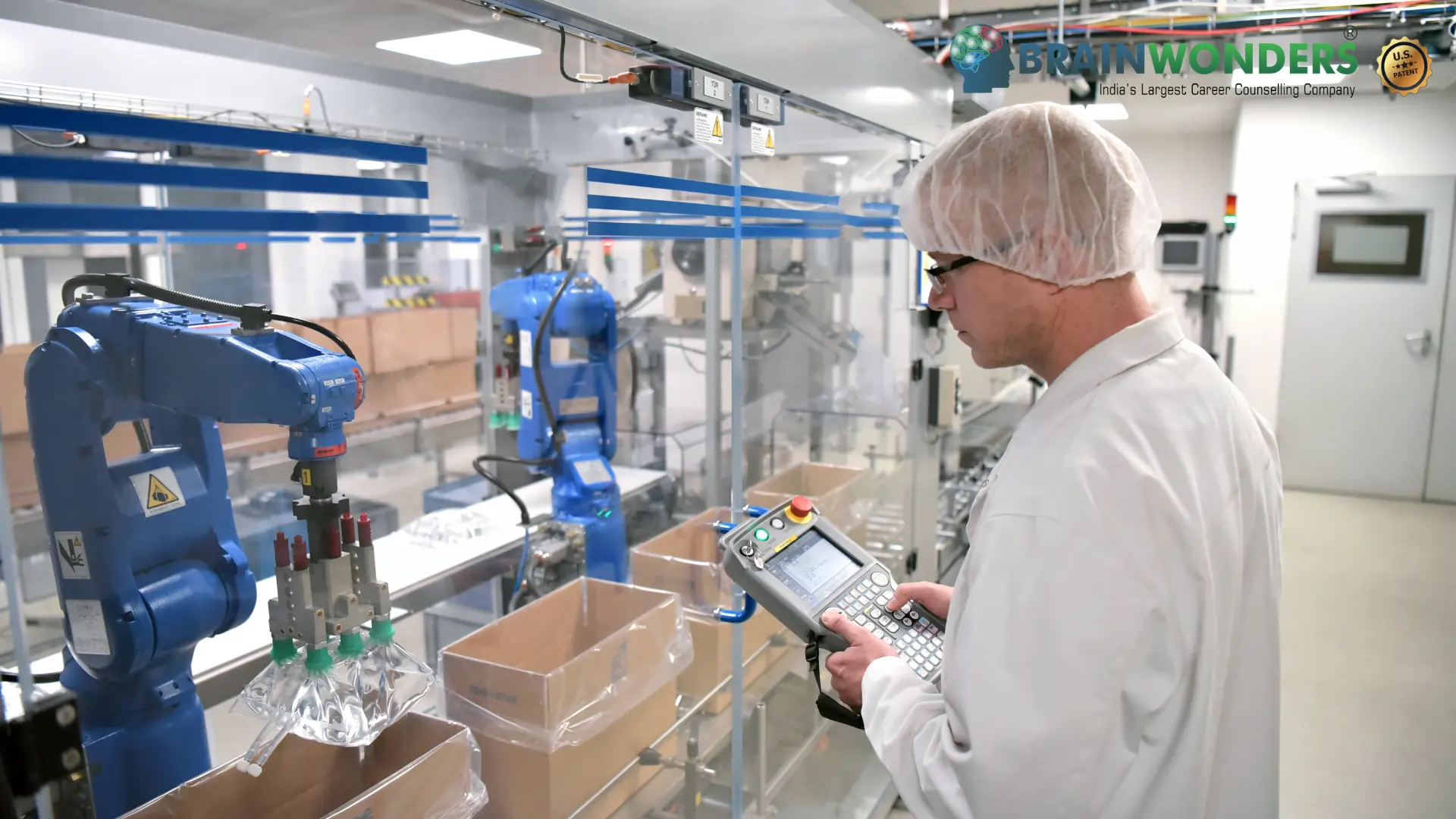How to become a Production & Manufacturing Sector
Overview, Courses, Exam, Colleges, Pathways, Salary

Overview
Who is Production & Manufacturing Sector ?
Manufacturing is the process of creating or producing items using machinery, labour, machinery, tools, and chemical or biological processing or formulation. It is the essence of the economy's secondary sector. Engineers who work in manufacturing Create, integrate, or enhance manufacturing systems or processes. Working with commercial or industrial designers to improve product designs for increased producibility and lower costs is possible. They use their knowledge of fabrication techniques, tooling and production equipment, assembly procedures, quality control standards, or product design, materials, and parts to identify opportunities or make adjustments to enhance manufacturing processes or products or lower costs. Provide manufacturing-related technical expertise or support.
Typical day at work
What does Production & Manufacturing Sector do?
The Production & Manufacturing Sector is responsible for transforming raw materials or components into finished goods on a large scale. This sector encompasses various industries that produce a wide range of products used in everyday life and various sectors of the economy. Here's an overview of what the Production & Manufacturing Sector does:
- Production Planning: The sector is involved in strategic planning to determine what products to manufacture, the quantity to produce, and the production schedule. This planning ensures that production meets market demand and is cost-effective.
- Procurement of Raw Materials: The manufacturing sector sources and procures raw materials, components, and parts required for production.
- Manufacturing Processes: Manufacturing companies use various techniques and processes to convert raw materials into finished goods. These processes can include cutting, shaping, moulding, assembling, welding, chemical reactions, etc.
- Quality Control: Ensuring the quality of the manufactured products is a critical aspect of the Production & Manufacturing Sector. Quality control measures are implemented to identify defects and maintain consistency in product quality.
- Equipment Operation and Maintenance: Manufacturing facilities use a range of machinery and equipment for production. The sector operates and maintains these machines to ensure smooth and efficient manufacturing processes.
- Inventory Management: Managing inventory levels is crucial to ensure a steady supply of products to meet customer demand while minimizing excess stock.
- Distribution and Logistics: Once products are manufactured, the sector handles their distribution and logistics to get them to retailers, wholesalers, or end consumers.
- Research and Development (R&D): Some manufacturing companies invest in R&D to innovate and improve their products or manufacturing processes.
- Compliance and Regulations: The sector must adhere to safety, environmental, and industry-specific regulations to maintain ethical and legal manufacturing practices.
- Continuous Improvement: Manufacturing companies strive for continuous improvement in efficiency, quality, and sustainability to stay competitive and meet changing market demands.
- Supply Chain Management: Managing the flow of materials and information from suppliers to manufacturers and distributors is critical in the Production & Manufacturing Sector.
- Environmental Sustainability: Many manufacturing companies focus on implementing sustainable practices and reducing their environmental impacts, such as energy efficiency, waste reduction, and recycling.
Abilities and Aptitude needed
What are the skills, abilities & aptitude needed to become Production & Manufacturing Sector?
In the Production & Manufacturing Sector, individuals need a combination of abilities, skills, and aptitudes. This industry is dynamic and requires diverse competencies to effectively contribute to the production processes and overall success of the manufacturing operation. Here are some key abilities, skills, and aptitudes needed to thrive in this sector:
- Technical Knowledge: A solid understanding of production processes, machinery, and manufacturing techniques is crucial. Familiarity with the specific industry and its equipment is essential to operate and troubleshoot machinery efficiently.
- Problem-Solving Skills: Manufacturing environments often present challenges and issues that require quick and effective problem-solving. Identifying and addressing problems in production processes is essential for maintaining efficiency and quality.
- Attention to Detail: Precision is vital in manufacturing, as even small errors can have significant consequences. Strong attention to detail ensures that products meet required specifications and quality standards.
- Time Management: Meeting production targets and deadlines is essential in manufacturing. Effective time management skills are necessary to plan and prioritize tasks to achieve production goals.
- Teamwork and Communication: Manufacturing facilities collaborate among different teams and departments. Strong teamwork and communication skills are essential to coordinate efforts and ensure smooth operations.
- Mechanical Aptitude: A natural inclination and understanding of how machines work can be advantageous in the manufacturing sector, especially for equipment operation and maintenance roles.
- Analytical Skills: Manufacturing processes generate vast amounts of data. Analyzing and interpreting data helps identify opportunities for improvement and efficiency.
- Adaptability: Manufacturing environments can change rapidly, whether due to new technologies, product designs, or market demands. Being adaptable and open to learning new techniques and technologies is essential.
- Health and Safety Awareness: Manufacturing can involve potential hazards. Understanding safety protocols and a commitment to maintaining a safe work environment is vital.
- Continuous Learning: The manufacturing sector is continuously evolving. Staying updated with industry trends and new technologies can help individuals remain competitive and relevant.
- Leadership Skills: For those aspiring to managerial positions, leadership skills are crucial to motivate teams, make strategic decisions, and drive process improvements.
- Quality Focus: A dedication to delivering high-quality products and maintaining quality standards is essential in the manufacturing sector to meet customer expectations and retain market competitiveness.
Salary
Salary for Production & Manufacturing Sector?
Salary for Production & Manufacturing is as follows :
- Minimum Monthly Salary: INR 60,000 to INR 1,00,000 or more for entry-level Psychiatrists or those with limited experience.
- Maximum Monthly Salary: INR 2,00,000 to INR 5,00,000 or more for highly experienced and skilled Psychiatrists, especially those with specialized expertise or working in reputed hospitals, clinics, or private practice.
- Annual Salary: Approximately INR 7.2 lakhs to INR 12 lakhs per year for entry-level Psychiatrists. Experienced and well-qualified Psychiatrists may earn a maximum yearly salary ranging from INR 24 lakhs to INR 60 lakhs or more.
- Highest-Paying Jobs and Scope: The highest-paying jobs for Psychiatrists are typically found in established hospitals, psychiatric clinics, and private practices. Psychiatrists with advanced degrees, specialized training, and excellence in patient care can command higher salaries and may have opportunities for career growth in leadership roles or academia. As mental health awareness increases, the demand for qualified Psychiatrists remains significant. They play a vital role in diagnosing and treating mental health conditions, providing therapy, and promoting mental well-being. With the growing recognition of the importance of mental health in society, there is a rising need for skilled Psychiatrists who can contribute to the field through clinical expertise and research endeavours. Psychiatrists with expertise in child and adolescent psychiatry, geriatric psychiatry, and addiction psychiatry will likely have excellent career prospects in the healthcare sector as psychiatry continues to evolve.
Pathways
How to become an Production & Manufacturing Sector?
Entrance Exam
Entrance Exam for Production & Manufacturing Sector ?
Courses
Which course I can pursue?
Best Colleges
Which are the best colleges to attend to become an Production & Manufacturing Sector?
Industries
Which Industries are open for Production & Manufacturing Sector?
The Production & Manufacturing Sector encompasses a wide range of industries involved in producing goods through various manufacturing processes. Here are some of the industries that fall under the Production & Manufacturing Sector:
- Automotive Industry: This industry is involved in the manufacturing of automobiles, including cars, trucks, motorcycles, and other vehicles.
- Electronics and Electrical Equipment Industry: Companies in this sector produce electronic devices, consumer electronics, appliances, electrical components, and related products.
- Aerospace and Defense Industry: This industry manufactures aircraft, spacecraft, and related equipment, as well as defence and military equipment.
- Food and Beverage Industry: Companies in this sector produce food products, beverages, and related items.
- Textile Industry: This industry involves the production of fabrics, clothing, and other textile products.
- Chemical Industry: Companies in this sector produce various chemicals, including industrial chemicals, speciality chemicals, and petrochemicals.
- Pharmaceutical Industry: This industry is responsible for producing pharmaceutical drugs and medications.
- Machinery Industry: Companies in this sector manufacture machinery, equipment, and heavy machinery used in different industries.
- Furniture Industry: This industry involves the production of furniture and related household items.
- Plastic and Rubber Industry: Companies in this sector produce plastic and rubber products for various applications.
- Steel and Metal Industry: This industry involves the production of steel, metal alloys, and metal products.
- Paper and Pulp Industry: Companies in this sector produce paper and pulp-based products.
- Renewable Energy Industry: This industry is involved in manufacturing renewable energy technologies such as solar panels, wind turbines, and batteries.
- Medical Devices Industry: This industry manufactures medical equipment and devices in healthcare settings.
- Consumer Goods Industry: Companies in this sector produce a wide range of consumer products such as toys, household products, and personal care items.
internship
Are there internships available for Production & Manufacturing Sector?
Internships in the Production & Manufacturing Sector are commonly available and can provide valuable hands-on experience for students or individuals looking to gain practical knowledge in this field. The specific availability of internships will depend on factors such as the location, the size of the manufacturing industry in the area, and the demand for interns from different companies. Here are some common types of internships available in this sector:
- Manufacturing Intern: This type of internship involves working on the production floor, assisting with the manufacturing processes, and understanding the day-to-day operations of a manufacturing facility. Interns may learn about quality control, production planning, equipment operation, and safety protocols.
- Engineering Intern: Some manufacturing companies offer internships where students can work with engineers to design, improve, or troubleshoot production processes and equipment. It provides an opportunity to apply engineering knowledge in a real-world setting.
- Supply Chain and Logistics Intern: These internships focus on understanding the flow of materials, inventory management, and distribution within a manufacturing company. Interns may assist with order processing, logistics coordination, and inventory optimization.
- Quality Assurance Intern: Quality assurance is critical in manufacturing to ensure that products meet the required standards. Interns in this role may be involved in testing and inspecting products, analyzing data, and contributing to quality improvement initiatives.
- Research and Development (R&D) Intern: Some manufacturing companies, especially in industries like pharmaceuticals or high-tech manufacturing, offer R&D internships. Interns in this role may work on developing new products, processes, or technologies.
- Health, Safety, and Environment (HSE) Intern: Manufacturing companies often have HSE departments to ensure a safe and environmentally responsible work environment. Interns may assist in safety inspections, compliance monitoring, and promoting a safety culture within the organization.
Career outlook
What does the future look like for Production & Manufacturing Sector?
The future for the Production & Manufacturing Sector appears promising, driven by technological advancements and evolving consumer demands. Automation, robotics, and artificial intelligence are transforming production processes, increasing efficiency and reducing costs. This sector will likely see continued growth in high-tech manufacturing, renewable energy, and medical devices. However, some traditional manufacturing jobs may be displaced by automation. Skilled workers with expertise in data analysis, programming, and technology integration will be in high demand.
Additionally, there will be an increased focus on sustainability and environmentally friendly practices, driving innovation in eco-friendly materials and processes. Overall, the Production & Manufacturing Sector will remain vital to the global economy. Still, it will require a skilled and adaptable workforce to capitalize on the opportunities presented by technological advancements and changing market dynamics.



